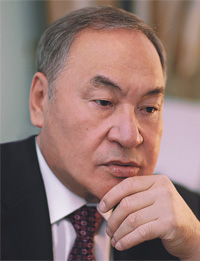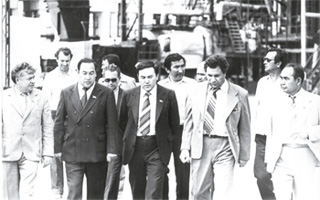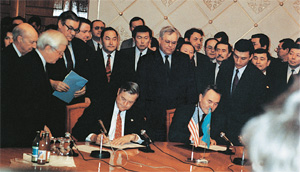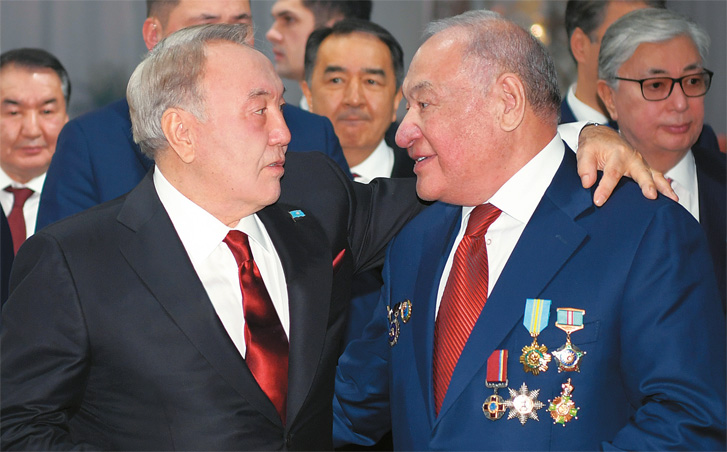Oil Generals
Honesty, respect and duty - the pillars I was raised on

Interview with Ravil Cherdabayev, the hero of the book “The First Minister of Oil. Ravil Cherdabayev"
In 2020, the authoritative oilman, the head of the famous oil dynasty in Kazakhstan, a prominent statesman, scientist, publicist, chronicler of the oil and gas industry Ravil Tazhigariyevich Cherdabayev celebrated his 80th birthday. Due to the coronavirus pandemic and the quarantine regime associated with it, the solemn celebration of the anniversary had to be canceled, but the significant date did not go unnoticed by Kazakhstani oil workers. Moreover, in honor of this event and in recognition of Ravil Cherdabayev’s invaluable contribution to the oil industry of Kazakhstan, the "Munayshy" Public Foundation named after N.А. Marabayev published a biography titled "The First Minister of Oil. Ravil Cherdabayev " under the "Kazakh munaiynyn ardaktylary" (Eng. "Veterans of Kazakhstani oil") book series.
Indeed, it is difficult to overestimate Ravil Cherdabayev’s contribution to the sovereign Kazakhstan’s oil sector development. He was directly involved in the launch of the most important projects for our country at the dawn of independence. Among them, the signing of the "contract of the century" with the Chevron corporation that established Tengizchevroil to develop the giant Tengiz oil and gas field. He was then appointed the first director of the joint venture on April 6, 1993 by the decree of the President of the Republic of Kazakhstan. Later on, in 1994 when the Ministry of Oil and Gas Industry of the Republic of Kazakhstan had been created he became the first minister of the newly established institution. He also represented Kazakhstani side at the international negotiations on the legal status of the Caspian Sea. It is also worth mentioning that for many years he headed the main oil region of the country - the Atyrau region - and oversaw the development of the fuel and energy sector during its rapid formation.
Having retired, Ravil Cherdabayev continued his active social and publicistic work. Over the past ten years he published a series of non-fiction books on the history of the global and domestic oil and gas industry, which took a rightful place among the world’s best popular science industry publications. The day before his anniversary, Ravil Cherdabayev gave an interview to Petroleum magazine.
- Ravil Tazhigariyevich, why did you choose the profession of an oilman?
- Five of the seven brothers, the youngest of whom was my father Tazhigara, went to work for Nobel Brothers, a foreign oil company, as they reached their adolescence. That enterprise was one of the first to start commercial production of Kazakhstani oil at the Dossor field discovered in the early 20th century. At home during family evenings, my father and his brothers often told us, kids, about the importance of oil for our life. As a teenager, visiting their workplaces, I was fascinated by how you can find oil deep underground and extract it to the surface. I was interested to know what equipment is used for this.
After finishing the 8th grade, I was hired as a locksmith apprentice at the Dossor plant for the repair of cars, tractors and oil equipment. At the same time I continued my studies at the evening school for workers. After graduating from the school, I went to the Dossor Evening Oil Technical College. By the time I entered the institute, I’d had five years of experience as a mechanic. Children, grandchildren and great-grandchildren of our relatives followed the similar path. This is how the Cherdabayevs dynasty of oil workers was formed. And today our total work experience in the oil and gas industry has exceeded 1300 years.
- Since the day Kazakhstan gained its independence and for more than 20 years you had been working in the team of the First President of Kazakhstan Nursultan Nazarbayev occupying various positions, such as the director of Tengizchevroil Kazakhstan-American JV, minister of oil and gas, akim of Atyrau region, Extraordinary and Plenipotentiary Ambassador, Special Representative of the Republic of Kazakhstan in international negotiations on the legal status of the Caspian Sea and deputy of the Mazhilis of the Parliament of Kazakhstan. What do you think the key achievements of Kazakhstan during the years of independence are?
- We are a happy generation. It was in front of our eyes that Kazakhstan was destined to become an independent state, which our ancestors dreamed of for many centuries.
Terrible pictures will arise if we recall the first years of independence. Long-term ties between the allied republics that used to be the parts of the USSR were suddenly interrupted. The products manufactured under the agreements concluded between them was no longer in demand, which led to massive downtime of numerous enterprises in various industries. Mass demonstrations, rallies of dissatisfied citizens became commonplace. The pages of newspapers were full of articles criticizing the leaders of the regions, as well as the country. Thanks to the reforms carried out in recent years by Gorbachev under the motto of “Glasnost”, “Perestroika” and democracy, many different social movements arose in the USSR. In a word, the country was approaching its inevitable collapse.
The only way out of this situation was to urgently attract foreign investment. But what state could give multibillion-dollar funds to a previously unknown country, which for many years had been part of Russia and then the Soviet Union? It was necessary to take urgent measures.
Undoubtedly, the proclamation and acquisition of independence should be considered the very first and significant achievement. Kazakhstan appeared on the world map as a country with clearly delineated borders, acquired its own army, created the governing structures necessary for an independent state and approved all state symbols.
During the years of independence, our country has attracted more than 70% of foreign investments from the total inflow to Central Asia. The largest investors are the Netherlands, USA, Switzerland, France, Great Britain, Russia, Italy, Japan, Belgium and Canada. In total, Kazakhstan received over 300 billion USD of investments.
The state program of industrial and innovative development, launched in 2009, is gradually changing the entire structure of the Kazakhstani economy. During the years of industrialization, 1250 new enterprises and more than 300 thousand jobs have been created. More than 100 countries of the world are consumers of Kazakhstani products. In recent years, we have mastered the production of more than 500 types of goods, previously not produced in Kazakhstan. About 50 new products are now exported by Kazakhstan. We have developed and approved The National Investment Strategy for 2018-2022.

In 2017, the International Specialized "Future Energy" EXPO Exhibition was held in Astana with great success. In addition to the effect of the demonstration of the newest "green" technologies, the latest achievements of science and technology in the field of safe and resource-saving energy to the young generation of Kazakhstanis and many investment agreements, this exhibition left a powerful infrastructure that will be actively used in the future.
Located in the EXPO exhibition area the Astana International Financial Center, created at the initiative of the Head of the State, has launched its operations since July, 2018. The AIFC will operate under English law. The center is intended to become a financial gateway, a center of investment capital attraction.
Our state has established itself as a full member of the international community, pursuing an invariably peaceful and constructive policy of friendship, good-neighborliness and mutually beneficial cooperation.
Even before independence, the President of the Kazakh SSR, Nursultan Nazarbayev, closed the world's largest nuclear weapons test site in the Semipalatinsk region by his Decree. Later, as a sovereign state, Kazakhstan abandoned its nuclear arsenal, the fourth most powerful in the world. These steps served to strengthen confidence on the part of the world community, including the leading powers, and ensured a friendly, constructive attitude towards the country.
The achievements of our country over all these years can make up a very long list! One interview will not be enough!
- This summer, the "Munayshy" Public Foundation named after Nasibkali Marabayev has published a book about your life written by Meirzhan Kurmanov - "First Minister of Oil. Ravil Cherdabayev”. Tell us more about it.
- Well, it came as a surprise to me, and a pleasant one, I must admit. As far as I know, the "Munayshy" Foundation is the only charitable public organization in our country created within a particular industry. The purpose of the fund is not only to take care of the veterans of the oil sector, but also to deeply research and fill in the blank spots in the history of our petroleum industry.
In 2005, the fund republished the supplemented, revised "Oil Encyclopedia of Kazakhstan" in 2 volumes in Kazakh, Russian and English. Since 2006, a great number of biography books about the lives of eminent oilmen of the country have been issued within the Fund’s "Kazakhstani Oil Veterans" and "The Victory" series. To date, more than a hundred books have already been published about veterans.
As for Meirzhan Kurmanov, the author of a book about me, I met him more than 10 years ago. He then worked as a translator for my brother Boris Cherdabayev, founder and chairman of the "Aldongar" Public Foundation for Cultural Development. Meirzhan is a philologist by education. During our first conversation he revealed himself as a person with good analytical skills, attention to detail. At that time I was finishing work on the book “Oil. Yesterday, today, tomorrow” and invited him to be the editor of this publication. Subsequently, he edited my other books. I am sincerely grateful to Meirzhan for his work.
I would also like to express my gratitude to Rakhman Isaev, Executive Director of the “Munaishy” Public Foundation named after Nasibkali Marabaev, for publishing a book about me.
- In recent years you have published several books about oil, a popular science publication about the Caspian Sea. Needless to say, one can study almost the entire history of oil in Kazakhstan just by your biography published this year. All this deservedly made you the chronicler of Kazakhstani oil production. Can you share how you manage to remain such a productive author for so many years? Where do you get the strength and inspiration to create?
- Firstly, while working in the civil service, in addition to current industry, economic, political tasks, I always wanted to do some additional scientific and analytical job. Any free hour I devoted to collecting, accumulating and systematizing various kinds of information, whether it was historical information or economic data and analytical articles on oil market. Over time, this became more than a hobby, and by a certain moment so much data had accumulated that it naturally began to pour out into a kind of integral "statement" in the form of a book. Then another book came out, followed by another one. With my retirement, this became possible in terms of free time, which I can now, with a clear conscience, completely devote to my favorite pastime.

Secondly, throughout my life I met many brilliant minds, outstanding professionals and wonderful personalities on my way, who shared with me their rare knowledge and experience, opinions and ideas. These were my teachers and mentors, senior comrades and colleagues. I, in turn, see it as my duty and responsibility to share this knowledge, passed through my personal and professional experience, with other people, my compatriots, the younger generation.
This is where I see my current task as a citizen of Kazakhstan. And this, I believe, gives me strength and motivation to create as an author and a person who has something to remember and share. I think that at all times it was most interesting for people to learn about the events of the past firsthand.
- Speaking of past events. You participated in the development of the “contract of the century” on Tengiz with Chevron; you were at the very signing of it in 1993, as well as at the conclusion of the agreement on Kashagan project with an international consortium in 1997. What do you think about these largest oil projects from today’s perspective? What, in your opinion, could or should be their further development?
- In 2021 Tengizchevroil will celebrate its 28th anniversary. It can be said that two-thirds of the 40-year contract on Tengiz oil field development has passed. This tremendous experience needs a detailed study to draw conclusions in order for the project to enter the last decade of the current agreement with maximum efficiency and to pass it with maximum output and potential for the future. All these conclusions should form the basis for the oil project’s development strategy in the remaining period.
My brother Boris, who, like me, had a chance to lead TCO as a director, in his book “Tengiz Oil Giant. The Record of Success”, published a couple of years ago, expressed a very important idea that now it is necessary to create a separate working group to study both world experience and the history of TCO activities over the past period of time. Such a study should objectively include all the pros and cons that took place in the current contract and translate into a strategy for the future development of Tengiz based on a new technological scheme and, accordingly, an understanding of the key conditions of the future agreement.
As for the North Caspian project, this is the second flagship project of the Kazakh oil industry. The Kashagan field has large oil reserves, huge potential, but it also poses the same huge challenges and technological tasks for our industry. The project is geologically complex, it is offshore. We all know what difficulties he went through from the very beginning of implementation. And in the current situation on the world market, these tasks are becoming extremely difficult.
Today's unpredictability of the global oil market requires a flexible, mobile approach to managing oil projects based on the ability to quickly make the right technological decisions, taking into account environmental safety and economic rationality. I believe that the time has come for oil projects to unite their efforts, to further develop partnerships and cooperation at all levels. For example, the further implementation of the Kashagan project should be synchronized with the Tengiz project in terms of infrastructure development, production, processing and marketing, and personnel work.
- Since we are talking about the challenges of the present and the future, can you share your thoughts on the further development of the oil and gas industry in Kazakhstan as a whole?
- First, the widespread digitalization process has been very active recently. And Kazakhstan does not stand aside. In December 2017, our government adopted a decree approving the Digital Kazakhstan program for 2018-2022. It is planned to allocate 108 billion tenge to implement this program. In 2016, our country was ranked 52nd out of 175 states in terms of digitalization. By 2022 Kazakhstan is expected to rise up to 30th place and to 15th place in the ranking by 2050.
Oil and gas currently form the basis of the real sector of the economy of Kazakhstan. Major oil companies around the world are moving towards the active use of digital technologies, from geological exploration to the final products sale. For example, Shell and Total use robotics; Chevron uses drones; Statoil applies digital visualization, using video technology to reveal the occurrence of leaks in pipelines. Lukoil implements projects aimed at digitalization of integrated field modeling; digital ecosystem; Rosneft implements digital oil field system; digital plant; digital supply chain, etc.
Of course, our oil producing companies are going to intensify the digitalization process in the coming years, as this is a guarantee to remain competitive. Digital technologies help to increase oil recovery, significantly reduce production costs. Therefore, the oil workers in Kazakhstan are faced with the task to accelerate introduction of digital technologies.
Secondly, in May 2013 the President of the Republic of Kazakhstan approved the concept for the country's transition to a "green economy". According to calculations, the “green economy” transformations will allow an additional increase in GDP by 3% and creation of more than 500 thousand new jobs by 2050. In total, it is planned to invest about 1% of GDP in the transition annually, which is equivalent to 3-4 billion US dollars per year. At the same time, the share of alternative and renewable energy should reach 50% in the country's electric power industry by 2050.
In our country there are 4.6 billion tons of recoverable oil reserves and 3.9 trillion cubic meters of gas. With annual production at the current level, there will be enough oil for 50 years and gas for 70 years. There is no doubt that in the coming years the search and discovery of new oil and gas fields will continue, which will replenish the overall reserves. Hence, we can make a bold conclusion that in the 21st century the relevance of oil and gas will remain. In addition, it is difficult to imagine a quick change of everything that is created on the basis of hydrocarbon fuel.
Our country is on the verge of great change. We, like all other countries in the world, face global economic and social challenges. This year circumstances clearly showed us how small and fragile our world is and how closely all of us, both peoples and states, are interconnected. And in this situation, the oil industry is acquiring even more strategic importance for our economy. It should remain the "driver" of the economy, of course, with the development of other economy sectors.

- Leafing through the pages of newspapers and magazines, I often come across your articles and essays about Kazakhstani oil workers. Tell us about this part of your activity.
- Since time immemorial, humanity has been telling stories sitting around the fire. From generation to generation they were passed from one person to another. In fact, it was storytelling - that is, the transfer of information, knowledge and experience - that made us who we are. My whole life is communication with people. I've always loved listening to stories. At a certain moment, you are filled with these wonderful stories of people like an overflowing vessel, and you want to share them with others.
In particular, I write about people – petroleum industry colleagues, friends – but, above all, about great professionals whom I have been honored to know personally and have been working together for many years, side by side. All of them made a significant contribution to the development of the oil industry, geological science and the economy of Kazakhstan. The story of their lives is also an important part of the Kazakhstani oil development history, and we must cherish it. By the way, I am now working on a book-collection of all my articles and essays about prominent Kazakhstani oil workers.
- You’ve turned eighty this year. You have gone through many challenges of the 20th century: difficult post-war childhood, "Cold War", "Perestroika" and the collapse of the USSR, all economic crises. As we all see, the 21st century has put humanity before another global threat - the coronavirus pandemic. What life principles have helped you through all these tough times?
- I was born on the eve of the Great Patriotic War. I spent my early childhood during the war years, formed as a person in the post-war years. In such difficult times, society and the family, as a unit of society, unite even stronger around the true family values: honesty, respect, duty, mutual support, mercy, care and attention to each other. In our family, these were not just loud words. They were the pillars on which the upbringing of children was based. We, children, absorbed these concepts and what stands behind each of them from every word and glance of the father, mother, father's brothers, from every mistake and misconduct.
At school, in addition to the family, we were educated in the spirit of patriotism, love for the homeland and discipline. During the Komsomol years, these values were entrenched in deeper concepts of duty and service to their country. And further in my career, no matter what positions I had to occupy, and wherever I had to fulfill my national duty, I tried to follow the same simple life principles - be honest with myself and people who trust you, take care of those who are weaker, try to live every day meaningfully, bringing benefits to my society and my state, be a better person today than I was yesterday. The most important things in life are really simple. And these principles have been and will remain unchanged at all times and under any political system.
- Thank you for your frank and meaningful interview and wish you many more years of life!
Oleg Chervinsky



